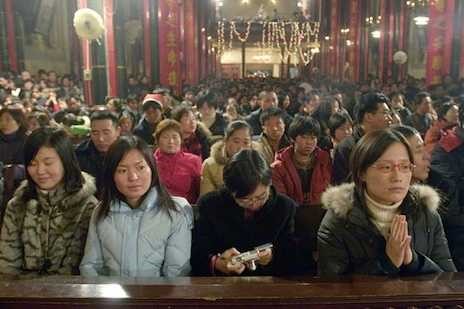
For most of my life I have rooted against China.
I was born the same year the Chinese announced they had become members of the exclusive club of nations who can deploy nuclear weapons. When I was a teenager, global sales of Mao Zedong’s Little Red Book momentarily surpassed those of the Bible and prompted millions of his most zealous young followers to commit acts of atrocity, even against their own parents.
During my adult years the United States became the world’s greatest debtor nation, and China the world’s greatest creditor. The Chinese economy rocketed into second place on the global scene. A massive military build-up followed. The People’s Republic continues to menace the island nation of Taiwan, which it claims for itself – and threatens war if outsiders dare to intercede.
China is our ideological enemy and the West’s greatest rival in the shaping of global civilization…right?
But something else has been happening in China during the course of our lifetimes – something that has received astonishingly little attention in the global media. China is not only the largest, most mysterious, and most sociologically dynamic country in the world. It has also become the site of the greatest spiritual revival in Christian history, a revolution that echoes the New Testament book of Acts.
No one saw it coming. Just 60 years ago Chairman Mao, the nation’s founding Communist dictator, endeavored to destroy every shred of religious influence in China. Four hundred years of mission work were undone. The ancient legacy of Confucianism was discredited. Pastors and missionaries were imprisoned or executed.
When Mao died in 1976 and the Bamboo Curtain was finally lifted, people everywhere wondered if any vestige of spirituality had survived all the purges.
Onlookers were amazed. The underground church in China was alive and well. Largely without pastors or buildings or Bibles or even the freedom to meet without fear, a wildfire Christian movement has brought an estimated 100 million Chinese people to faith. In fact, if the next 24 hours are typical, more than 30,000 Chinese citizens will trust Christ for the first time.
I had the chance to visit China more than a decade ago. Virtually everything – from crowds to cars to bicycles to smog to new businesses to new churches – was off the charts. One Chinese pastor pleaded with his members not to attend church more than once each Sunday, in order to provide space for other people. I’m not aware of any American church leaders who have recently had to make a similar request.
Some earnest Westerners still try to smuggle a Bible or two into China inside their luggage. Such risk-taking is no longer required. I visited Amity Press in Nanking, which has been openly printing copies of Scripture since 1986. Amity now churns out as many as one million Bibles per month – and exports a number of those to the United States.
A number of PRC leaders have quietly or even publicly embraced Christianity. Several times I heard this aphorism: “It used to be said that a convert to Christianity was one less Chinese. Now a new convert is described as a better Chinese.” According to the Chinese academic Zhao Xiao, himself a young Christian, Christianity offers China a new “common moral foundation capable of reducing corruption, narrowing the gap between rich and poor, promoting philanthropy, and even preventing pollution.”
In his book Civilization, the British historian Niall Ferguson reports that shortly before Jiang Zemin stepped down as China’s president and Communist Party leader, he apparently told a gathering of high-ranking Party officials that, if he could issue one decree that he knew would be obeyed everywhere, it would be to “make Christianity the official religion of China.”
Ferguson quotes a scholar from the Chinese Academy of Social Sciences:
“We were asked to look into what accounted for the…pre-eminence of the West all over the world… At first, we thought it was because you had more powerful guns than we had. Then we thought it was because you had the best political system. Next, we focused on your economic system.
“But in the past twenty years, we have realized that the heart of your culture is your religion: Christianity. That is why the West has been so powerful. The Christian moral foundation of social and cultural life was what made possible the emergence of capitalism and then the successful transition to democratic politics. We don’t have any doubt about this.”
The amazing thing is that so many people in the West do have doubts about this.
It may be that the heart of our culture used to be the degree to which we paid attention to God. But that is certainly no longer so.
That’s why, in one important respect, I’m rooting for China these days.
Oh, I’ll always be cheering for American athletes to best their Chinese counterparts, and for U.S. businesses and farmers to more than hold their own when it comes to international trade.
But my deepest hope is that the new spiritual strength of China might become a reality so powerful that we cannot afford to ignore it – or fail to reclaim it as our own.
